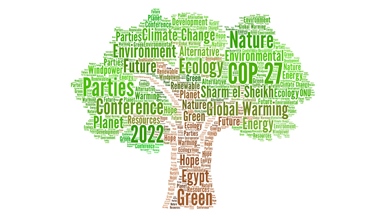Loading component...
At a glance
By Rachel Williamson
Despite the nerdy arguments and a COP (conference of parties) in implementation mode of commitments made in 2015 in Paris, there were distinct winners and losers when the summit closed 39 hours later than planned.
The winners were developing economies, which pressured richer nations into agreeing to a loss and damage fund, says Patrick Viljoen CPA, senior manager for ESG at CPA Australia.
Developed economies have long resisted taking fiscal responsibility for losses and damage in poorer countries that are attributed to climate change, such as the floods in Pakistan in June 2022, out of fear of an unknown quantum of cash demands.
Many jurisdictions, such as Australia and the EU, flipped before or during COP27.
Australia’s climate about-face after its change of government in May has led to a political and a budgetary realignment toward its Pacific neighbours, most of which are poorer and more affected by climate change.
1.5°C is slipping away
One of the more disappointing elements of COP27 is that the world is stuck in a 1.5°C mantra, yet few nations are lifting their climate ambitions as intended under the ratcheting mechanism that was built into the Paris Agreement, Viljoen says.
The possibility of sticking to 1.5°C warming is becoming less and less possible, based on countries’ stated aims — and the ways they’ve missed those goalposts.
“There’s a bit of a disconnect as far as that language around 1.5°C. It was basically condoning that what you’re doing at the moment is OK; we know it’s not,” he says.
“In terms of acknowledging that wealthy, developed economies are disproportionately contributing toward carbon emissions and the effects of such emissions, that’s now happening, which is good, because it gives developed economies less of an opportunity to hide.”
Only 34 countries have submitted or updated their national contributions to minimising global warming to 1.5°C since COP26.
Australia, with its newly legislated 43 per cent emissions reduction target by 2030, is among them, as are Bangladesh, Cambodia, Brunei, Bhutan, Timor-Leste, Vietnam, Singapore, Thailand, Indonesia, India, Korea and New Zealand.
Big accounting changes coming
The biggest impact on finance professionals globally will be the International Sustainability Standards Board (ISSB) reporting standards.
The new ISSB, promised at COP26, is deep in the process of building a global baseline of climate disclosure standards.
In terms of the ISSB we still see conflicts being aired over the use of the words “significant” and materiality, says Viljoen.
“The word ‘significant’ in accounting circles has absolutely no meaning. We put a lot of emphasis on materiality. But the ISSB took that recommendation on board,” he says.
“The other big issue is the fact that it approaches value from the perspective of providers of capital and debt or ‘enterprise value’ and doesn’t look more broadly at the whole range of stakeholders that impact or draw a benefit from an organisation, which is in stark contrast with things like the Global Reporting Initiative for sustainability.”
There are two draft standards, a general standard of sustainability disclosure and a climate-specific one which has received much traction already, with Nigeria indicating that it will be adopting the standards once released.
The former is more contentious, because it is setting itself up to be a standard and a conceptual framework, which is confusing what the standard is trying to do, Viljoen says.
Mandatory standards on way
The ISSB’s work will have repercussions right down to SMEs.
In Australia discussions are underway with Treasury releasing the first consultation in December 2022 and the next in March 2023, with questions being asked about whether climate-related disclosures and reporting will mean the ASIC Act and Corporations Act will need to be changed.
Viljoen believes mandated standards will take effect in 2024.
“I think there’s this perception in the broader marketplace that climate is something which is on the periphery, it’s a bit esoteric.
“But when the standards become formalised and, in places like New Zealand, become mandatory, it changes that ball game completely, because it’s no longer something that you can ignore,” Viljoen says.
“As we draft the standards, we must make sure the assurance burden is not so high that assurance providers can’t make it work. And from the perspective of the accountant working for an SME without big pockets for advisory, how do you take them on the journey?
“They might not need to comply legislatively in terms of the standards, but if the SME works with a larger corporation, they may need to comply with parts of the standards in order for the bigger company to do its own reporting.
“The practical application of these changes is set to create some very exciting times.”

